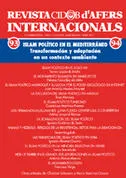The islamist movement in Morocco: Between institutionalisation and associationism

This article analyses the dissimilar evolution of the Islamist movement in Morocco, from the corona­tion of Mohamed VI in 1999 to the present day, a period that has seen changes in relations between the monarchy, Islamism and governance, and which has given rise to a complex triangle in its organisation as a whole. The attitude of those in power towards the Islamist movement in Morocco has undergone a long journey, fluctuating between different attitudes: an initial boost, confrontation, manipulation, “assimilation” of moderates and the exclusion of radicals. The relational scenario changed after the Casablanca bombings in 2003, the consequences of which were manifested in this region on two dif­ferent levels: the monarchy’s attempt to reinstate its monopoly of the religious sphere, and the invalidity of the idea that Morocco was an exception to Islamist terrorism. The official line in Morocco is based on consecrating the king as the basic pillar of the country’s political stability, given that he holds a dual constitutional representation: head of state and prince of the believers.
Key words: Islamism, Islam, monarchy, democratisation, political system
The full text articles of this issue are available only in Spanish language